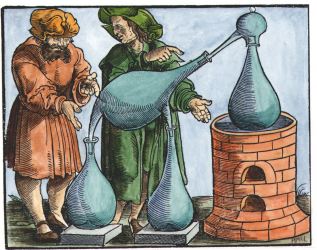| Author | Post |
|---|
Alan Pritchard
Guest
| Joined: | |
| Location: | |
| Posts: | |
| Status: |
Offline
|
|
Posted: Sat Aug 7th, 2010 04:50 pm |
|
Lemaitre-Provost, Solange
MA thesis. McGill University, 2005
http://digitool.library.mcgill.ca/exlibris/dtl/u3_1/dtle/www_r_eng/icon/ico_pdf.gif
This thesis is the first modern critical edition of La Complainte de Nature, a poem of alchemy written in middle French containing 1822 verses in the base manuscript. This work is divided in two parts: in the first, Nature presents her grievances to the alchemist so that he ceases his quest for the philosopher's stone by explaining to him that only she, Nature, can produce gold. In the second part, the alchemist promises to abandon his futile quest and to obey the laws of Nature. The accompanying text contains an introduction offering precisions about the author, the work, and its context; footnotes grouping together variants of two other manuscripts and of the first and last editions; and a general glossary containing specialized terms and some locutions, in addition to a table of proper nouns which will help to clarify some of the textual facts and to facilitate comprehension of the text.
|
adammclean
Member

| Joined: | Fri Sep 14th, 2007 |
| Location: | United Kingdom |
| Posts: | 606 |
| Status: |
Offline
|
|
Posted: Sat Aug 7th, 2010 05:47 pm |
|
If you backspace and find the search box you can search for various terms. I found these four theses related to alchemical themes.
Wagler, Brent M. Stars, stones and architecture : an episode in John Dee's natural philosophy
Latto, Jeff. The idea of transmutation in the theatre of Giulio Camillo /
Dambergs, Janis. Les symboles alchimiques chez les poètes maudits : essai d'interpretation hermetique de la poesie.
Casey, Stephen Charles. The christian magisterium of L. Caecilius Firmianus Lactantius.
|
Carl Lavoie
Member
| Joined: | Wed Feb 25th, 2009 |
| Location: | Canada |
| Posts: | 215 |
| Status: |
Offline
|
|
Posted: Sun Aug 8th, 2010 08:35 pm |
|
.
Thank you Alan for that very interesting study, which complements the thread on Francis I and his entourage.
Two little reservations, though, regarding the glossary and the index of names appended (pp. 116-132, and 133-135):
a) The name ‘Souffleur’ (puffer) is put for ‘an alchemist’. No distinction is made, it isn’t perceived as a derogatory term. But every single use of it, in the complaint (or rather reprimand) of Nature, betrays a blatant scorn. For example, on fol.27.r (verses 953-954), the Nature says to the alchemist:
« Laisse souffleurs et sophisticques / Et leurs œuvres diabolicques. »
It’s the opposite type, the ‘philozophes’ (‘philozophique’, ‘philozophie’ ; as in verse 979 : « C’est ung feu de philozophie.»), who are, in the poem, duly praised, that are the alchemists, and which actually take the defence of alchemy (see v. 1487-1489, where the alchemist fulminates : « Et se taisent tous les venteurs, / Sophistes investigateurs / De l’alkemie »).
.............................................................................................................
b) And we are told, in the index of names, that Saslomon (sic), on v.888, refers to: «Salomon Trimosin, alchimiste du XVe siècle »; but Perréal really alludes to the biblical Solomon (v.888-894) :
Comme Salomon le designe,
En son livre bien authentique
Qu'on dit l' Esclesiasticque :
Et là tu trouverras le tiltre
Au trente huitiesme chappitre :
Dieu la crea, en terre est prise :
L’homme prudent ne la desprise.
Last edited on Mon Aug 9th, 2010 06:59 am by Carl Lavoie
|

Current time is 09:41 am | |
|
|
|

